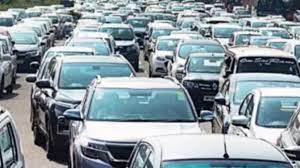New Delhi, Feb 26: VE Commercial Vehicles (VECV), a joint venture between Volvo Group and Eicher Motors, expects prices of its models to rise by up to 5 per cent with stricter emission norms coming into force from April this year in the country.
VECV sells a range of trucks across 4.9-55 tonne GVW, along with a wide range of buses with seating capacity of 12-72 across light, medium and heavy-duty applications.
“As far as the cost increase is concerned, it is not going to be like the earlier BS IV to BS VI (transition), it will be much lower than that, which should be within, I think 3 to 5 per cent,” VECV MD & CEO Vinod Aggarwal said in an analyst call.
He was replying to a query on the company’s plans regarding upgrading its model range conforming to new emission norms which kick in from April 1 this year.
“Model changeover is going to happen in Q4FY23 in a phased manner. And by April 1, we will move 100 per cent to an OBD-2 (on-board diagnostics),” Aggarwal said.
The Indian automobile industry is currently working to make their products meet the second phase of Bharat Stage VI, equivalent to Euro-VI emission norms, in real-time driving conditions.
Four-wheeler passenger and commercial vehicles will need more sophisticated equipment to be added to meet the next level of emission standards. Vehicles will need to have an on-board self-diagnostic device to monitor the real-time driving emission levels.
The device will constantly monitor key parts for meeting emission standards such as the catalytic converter and oxygen sensors, to keep a close watch on emissions.
In a scenario wherein the emissions exceed the parameters, the device will indicate through warning lights that the vehicle be submitted for a service.
India leapfrogged to BS-VI emission regime from BS-IV with effect from April 1, 2020. The transition saw the domestic automobile industry pumping in around Rs 70,000 crore to upgrade its technology.
Replying to a query if the company was looking to build up inventory in anticipation of pre-sales, Aggarwal noted: “I don’t think we are going to create any inventory for having this benefit. There is no such plan. And I don’t think we will suffer because of a lack of production, because a lot of our models will move to OBD-II even before. So, there is no concern on production in our inventory build-up of OBD-II. We don’t see any concern.”
Aggarwal said the company’s total sales in the third quarter this fiscal stood at 18,162 units, up 13.2 per cent from 16,044 units in the same quarter of 2021-22.
The company’s revenues from operations rose to Rs 4,603.9 crore from Rs 3,625.7 crore in October-December 2021-22, he added. (PTI)
Trending Now
E-Paper


